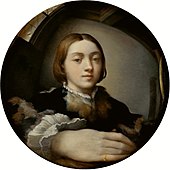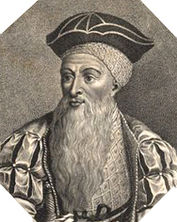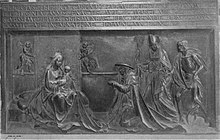1503
Portal history | Portal Biographies | Current events | Annual calendar
◄ |
15th century |
16th century
| 17th century
| ►
◄ |
1470s |
1480s |
1490s |
1500s
| 1510s
| 1520s
| 1530s
| ►
◄◄ |
◄ |
1499 |
1500 |
1501 |
1502 |
1503
| 1504
| 1505
| 1506
| 1507
| ►
|►►
| 1503 | |
|---|---|
|
Giuliano della Rovere becomes Pope Julius II. |
Afonso de Albuquerque discovers the island of Assunção . |
|
The Spanish trading house Casa y Audiencia de Indias is established. |
|
| 1503 in other calendars | |
| Armenian calendar | 951/952 (turn of the year July) |
| Ethiopian calendar | 1495/96 |
| Aztec calendar | 10. Rabbit - Matlactli Tochtli (until the end of January / beginning of February: 9th house - Chicuhnahui Calli ) |
| Buddhist calendar | 2046/47 (southern Buddhism); 2045/46 (alternative calculation according to Buddhas Parinirvana ) |
| Chinese calendar | 69th (70th) cycle
Year of the Water Pig癸亥 ( at the beginning of the year Water Dog 壬戌) |
| Chula Sakarat (Siam, Myanmar) / Dai calendar (Vietnam) | 865/866 (turn of the year April) |
| Dangun era (Korea) | 3836/37 (October 2/3) |
| Iranian calendar | 881/882 |
| Islamic calendar | 908/909 (turn of the year 25/26 June) |
| Jewish calendar | 5263/64 (September 20-21) |
| Coptic calendar | 1219/20 |
| Malayalam calendar | 678/679 |
| Seleucid era | Babylon: 1813/14 (turn of the year April)
Syria: 1814/15 (turn of the year October) |
| Spanish era | 1541 |
| Vikram Sambat (Nepalese Calendar) | 1559/60 (turn of the year April) |
Events
Politics and world events
Russo-Lithuanian War
- The Polish , Lithuanian and Livonian ambassadors who met in Smolensk on February 27 , will meet in Moscow on March 5 for peace talks . Ivan III insists on separate negotiations and concludes a six-year armistice with the Polish-Lithuanian Union on March 28th . The Grand Duchy of Moscow gains large areas in the northeast and east. As is customary, the result of the negotiations with Livonia will be drawn up in three separate contracts and signed in Novgorod in July.
Italy
- February 13th : The pre-arranged duel of Barletta takes place near Barletta in southern Italy , in which 13 Italian knights win over 13 French knights. The occasion is a condescending remark by the French military leader about Italian martial virtues.
- April 28 : In the Battle of Cerignola , a Spanish-Italian army led by General Gonzalo Fernández de Córdoba y Aguilar and Condottiere Ettore Fieramosca defeats the French.
- After the death of Pope Alexander VI. On August 18th, numerous disempowered city lords took over the rule in the areas conquered by Alexander's son Cesare Borgia , including Perugia , Piombino , Città di Castello and Camerino .
- September 1st : The warring families Borgia , Colonna and Orsini agree to leave Rome until a new Pope is elected .
- October 3 : After the election of Pius III. Cesare Borgia returns to Rome and is besieged by his enemies in Castel Sant'Angelo.
- October 29 : Cesare Borgia agrees with Giuliano della Rovere that the Spanish cardinals who are loyal to the Borgias should vote for della Rovere in the conclave and that he himself will remain ruler in Romagna and papal military leader in return . After his election on November 1st, however , Julius II broke his promise, disempowered Cesare and took Romagna for the papal state .
- November 19 : Cesare Borgia flees to Ostia .

- December 29 : After the battle on the Garigliano expel the Spaniards under Gonzalo Fernández de Córdoba in Italy with the support of the invading mercenary in Italy France and remain under Ferdinand II. Gentlemen in the kingdom of Naples .
Landshut War of Succession
- December 1 : The death of Duke Georg von Bayern-Landshut leads to the Landshut War of Succession . Due to the lack of male descendants, the deceased has appointed his daughter Elisabeth to be the heiress and has already handed over Landshut Castle to her husband Ruprecht von der Pfalz , which contradicts the Wittelsbach house contract . This calls Albrecht IV as Duke of Bavaria-Munich on the scene.
- December 13th : In Landshut there is a state parliament at which Ruprecht is personally present and Albrecht asserts his claims through envoys. The Lower Bavarian estates then turn to the Reich Chamber Court, created in 1495 . King Maximilian I appoints the parties to the dispute for an arbitration award in the Augsburg City Hall on February 5, 1504 .
Further events in the empire
- February 9 : After almost 47 years in office, Johann II of Baden , Archbishop and Elector of Trier, dies . His great-nephew Jakob II von Baden , who had been coadjutor with the right of succession for two years, was elected his successor against the opposition of a not inconsiderable part of the cathedral chapter as well as the nobility and the estates.
- December 20 : After the death of Magnus II , his sons Heinrich V , Erich II and Albrecht VII , as well as his brother Balthasar, initially rule the Duchy of Mecklenburg jointly.
Voyages of discovery and colonies
Spain
- May 10th : Christopher Columbus reaches the Cayman Islands on his fourth voyage , which he gives the name Las Tortugas because of the numerous sea turtles he has encountered . Then he was shipwrecked off Jamaica when the Vizcaína caravel , which had been destroyed by the shipworm, had to be abandoned. 32 men then undertake a journey of around 400 nautical miles to Hispaniola in two canoes , only two of which survive, including Columbus' ship clerk and confidante Diego Méndez . However, Governor Nicolás de Ovando , whose relationship with Columbus is marked by deep enmity, does nothing until the end of the year to help the stranded, who in the meantime mainly survive through trade with the natives.
- Queen Isabella I introduces the encomienda system in the Spanish colonies in Latin America. The conquistadors were given very large estates along with the indigenous population living there in trust.
- Juan de Bermúdez is the first European to see the island of Bermuda without setting foot on it.
Portugal
- May 20 : The Portuguese navigator Afonso de Albuquerque rediscovered a forgotten island in the South Atlantic, which he now gives the name Assunção because it was sighted on the day of Ascension . It is known by the name, which is translated into English, Ascension . In the same year de Albuquerque rediscovered the Churiya-Muriya Islands in the Arabian Sea and gave them the name that is still used in Europe today.
- Zanzibar becomes Portuguese .
France
- The French Binot Paulmier de Gonneville embarks on a two-year journey of discovery in search of the legendary Terra Australis .
economy
- January 20 : In Seville created the the trade with the Spanish colonies regulatory authority Casa de Contratación .
science and technology
- The encyclopedia Margarita Philosophica by Gregor Reisch , created between 1489 and 1496, was first printed in Freiburg by the Strasbourg printer Johann Schott . As Universitas literarum, the work contains the entire human knowledge of the late Middle Ages . The “ Seven Liberal Arts ” are dealt with in twelve books, followed by the principles and origin of natural things, physiology, psychology and moral philosophy. For 100 years the work became the most widespread textbook of philosophy and encyclopedic knowledge for the study of Artes liberales . It is considered the oldest printed encyclopedia . Numerous new editions and pirated prints appeared from the following year.
- The Bolognese Ludovico de Varthema joins a caravan to Mecca and Medina in Damascus and later describes the holy places of Islam in his travelogue ( Itinerario ) in great detail and without bias.
Culture
- Albrecht Dürer paints the watercolor The large piece of lawn , his only reliable study of plants.
- Erasmus von Rotterdam wrote the early work Enchiridion militis Christiani , a small manual with instructions on how to behave as a Christian knight .
- around 1503: The prayer book of Jacob IV is created.
society

After a bar test , a form of divine judgment , the former mercenary Hans Spiess is sentenced to death in Ettiswil for the murder of his wife and executed by wheels .
religion
Christianity
After more than ten years of pontificate , Pope Alexander VI dies . - probably from malaria - in Rome. Numerous myths soon grew up around the death of the Renaissance Pope on August 18th . The body of the deceased had swollen unnaturally within a very short time, had turned black and secreted foul-smelling liquids, which is viewed by the population as evidence of a poisoning. In addition, the soul of whether nephew was immediately taken by the devil.
As his successor chooses the conclave on September 22 Francesco Todeschini Piccolomini, the name Pius III. accepts. After just 26 days in office, however, he too died on October 18 . In a one-day conclave on November 1st, Giuliano della Rovere was elected Pope, who was to serve under the name of Julius II in the following years . The enthronement will take place on November 26th . The new Pope, who himself came to the papal throne by prior arrangement, forbids the acquisition of the papal throne through simony for the future, subject to severe church penalties .
Buddhism
- Under King Ramathibodi II the Ubosot of the Buddhist temple complex Wat Na Phra Men is built in Ayutthaya .
Born
First half of the year

- January 11 : Parmigianino (Gerolano Francesco Maria Mazzola), Italian painter († 1540 )
- January 18 : Joachim , Duke of Münsterberg and Oels, Count von Glatz, Bishop of Brandenburg († 1562 )
- February 24 : Johannes Gropper , German Catholic theologian, lawyer and church politician († 1559 )
- March 10 : Ferdinand I , Holy Roman Emperor († 1564 )
- March 17 : Niccolò Ardinghelli , Italian cardinal († 1547 )
- April 6 : Jakob Micyllus , German humanist and pedagogue († 1558 )
- April 18 : Henry II , titular king of Navarre († 1555 )
- April 30th : Johann III. von Henneberg-Schleusingen , Prince Abbot of Fulda († 1541 )
- May 1 : Celio Secondo Curione , Italian scholar and reformer († 1569 )
- June 1 : Wilhelm von Grumbach , German knight and adventurer († 1567 )
- June 9 : Johann von Glauburg , Frankfurt patrician and mayor († 1571 )
- June 30 : Johann Friedrich I , Saxon Elector and Duke († 1554 )
Second half of the year
- July 3 : Franz Burchart , German scholar and politician († 1560 )
- July 23 : Anna Jagiello of Bohemia and Hungary , German noblewoman († 1547 )
- August 12 : Christian III. , King of Denmark and Norway († 1559 )
- October 24 : Isabella of Portugal , wife of Charles V († 1539 )
- November 12 : Philip , Count Palatine and Duke of Palatinate-Neuburg († 1548 )
- November 17 : Agnolo Bronzino , Italian painter († 1572 )
- November 19 : Pier Luigi Farnese , Duke of Parma and Piacenza († 1547 )
- December 14 : Michel de Notre-Dame , French doctor and astrologer († 1566 )
Exact date of birth unknown
- Bartolomé de Carranza , Archbishop of Toledo († 1576 )
- Elisabeth of Hesse , Duchess of Zweibrücken and Countess Palatine of Simmern († 1563 )
- Katharina Jagiellonica , Countess of Montfort († 1548 )
- Aonio Paleario , Italian humanist, rhetorician and reformer († 1570 )
Died
January to April
- January 20 : Ludmilla von Podiebrad , Duchess of Liegnitz and Brieg (* 1456 )
- before January 27: John Donne , Welsh nobleman, civil servant and diplomat (* around 1430 )
- before January 30th: Simon Lainberger , Nuremberg sculptor
- February 2 : Martin Kabátník , Czech traveler, writer and member of the Brothers Unity (* 1428 )
- February 9 : Johann II of Baden , Archbishop and Elector of Trier (* 1434 )
- February 11 : Elizabeth of York , Queen of England (* 1466 )
- February 15 : Henry Deane , Archbishop of Canterbury (* 1440 )
- February 22nd : Giovanni Battista Orsini , Italian cardinal, administrator of the Archdiocese of Taranto, legate and administrator for Romagna, Bologna and the Mark of Ancona (* around 1450 )
- March 13 : Friedrich Jagiello , Bishop of Cracow, Archbishop of Gniezno and Primate of Poland-Lithuania (* 1468 )
- March 24th : Dorothea von Rieneck , Countess of Leuchtenberg and Countess of Wertheim (* around 1440 )
- April 28 : Louis d'Armagnac , French nobleman, Count of Guise, Count of Pardiac and Duke of Nemours (* 1472 )
- April 28 : Johannes Tolhopf , German humanist, rector at the University of Ingolstadt and Canon of Regensburg (* 1429 )
May to August
- May 20 : Lorenzo di Pierfrancesco de 'Medici , Florentine nobleman and patron (* 1463 )
- May 31 : Barbara Gonzaga , Duchess of Württemberg (* 1455 )
- June 6th : Andreas Proles , German theologian (* 1429 )
- June 24th : Reginald Bray , English nobleman and politician (* 1440 )
- July 1 : Louis I. d'Amboise , Bishop of Albi (* before 1462)
- July 3 : Pierre d'Aubusson , Grand Master of the Order of St. John (* 1423 )
- July 7th : Wilhelm II , Duke of Braunschweig and Lüneburg, Prince of Braunschweig-Wolfenbüttel and Prince of Calenberg-Göttingen (* around 1425 )
- July 12th : Sophie von Mecklenburg , Duchess of Saxony (* 1481 )
- July 24th : Luise of Savoy , French noblewoman and nun (* 1462 )
- July 27 : Johann von Dalberg , Bishop of Worms and Chancellor of the University of Heidelberg (* 1455 )
- August 1st : Juan de Borja Lanzol de Romaní , Archbishop of Monreale, Administrator of Olomouc, Bishop of Melfi, Bishop of Ferrara and Latin Titular Patriarch of Constantinople (* 1446 )
- August 2nd : Force VI. von Hohenlohe-Waldenburg-Neuenstein , Canon in Mainz and Speyer (* 1452 )
- August 5th : Wipert von Finsterlohe , Canon in Speyer and Würzburg
- August 12 : Anna of Poland , Duchess of Pomerania (* 1476 )
- August 18 : Roderic Llançol i de Borja, under the name Alexander VI. Pope (* 1431 )
- August 18 : Konrad Türst , federal scientist (* around 1450 )
September to December
- September 7th : Veit I. Truchseß von Pommersfelden , Prince-Bishop of the Bishopric of Bamberg
- September 9 : Philipp , Margrave of Hachberg-Sausenberg and Count of Neuchâtel (* 1454 )
- September 17th : Giovanni Pontano , Italian poet and humanist (* 1429 )
- October 2 : Martin Fuhrmann , German philologist, theologian, university professor and founder of a scholarship foundation (* around 1450 )
- October 10 : Pierre II. De Bourbon , Duke of Bourbon (* 1438 )
- October 18 : Francesco Todeschini Piccolomini, under the name of Pius III. Pope (* 1439 )
- October 26 : Hans von Trotha , German Marshal of the Palatinate Elector (* before 1467 )
- November 10 : Israhel van Meckenem the Younger , German engraver (* around 1445 )
- November 12th : Albrecht V. Göler von Ravensburg , German nobleman, Vogt in Kreuznach (* 1444 )
- November 20 : Magnus II , Duke of Mecklenburg (* 1441 )
- November 23 : Margaret of York , Duchess of Burgundy (* 1446 )
- December 1 : George the Rich , Duke of Bavaria-Landshut (* 1455 )
- December 5 : Johann Spender , auxiliary bishop in Cologne (* 15th century)
- December 14th : Sten Sture the Elder , imperial administrator of Sweden (* around 1440 )
- December 21 : Adam von Podewils , Princely Pomeranian Privy Council, governor in Zanow and Belgard
- December 24th : Konrad Loste , Bishop of Schwerin (* between 1416 and 1418)
- December 28th : Piero di Lorenzo de 'Medici , "the unfortunate", ruler of Florence and Italian mercenary (* 1472 )
Exact date of death unknown
- Andrea Bregno , Italian sculptor (* 1418 )
- Andrés Gutiérrez de Cerezo , Spanish humanist and university professor (* 1459 )
- Johann Erer , Mayor of the Imperial City of Heilbronn
- Elias von Křenowitz , priest and bishop of the Bohemian Brethren
- Hans Nussdorf , Basel builder (* around 1420 )
- Sofia Palaiologa , Grand Duchess of Moscow (* around 1448 )
- Gentiflor Pfäffinger , Hereditary Marshal of Lower Bavaria (* before 1442)
- Dietrich von Schachten , North Hessian nobleman and ministerial, pilgrim to the Holy Land (* around 1445 )
- Hans Spiess , German mercenary
- Alvise Vivarini , Venetian painter (* around 1442 )
- Ulrich von Weißpriach , Austrian nobleman, governor of Carinthia (* 1437 )
Others
This year served as the name template for the computer game Anno 1503 .













